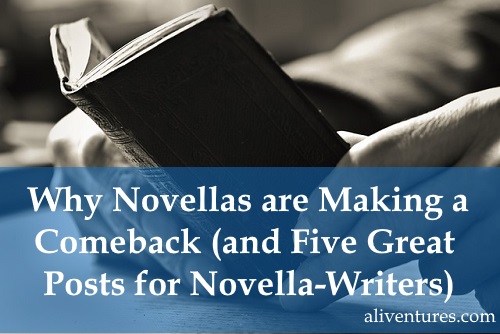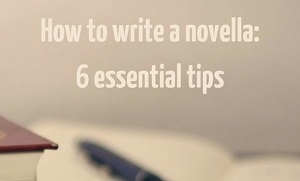Why Novellas are Making a Comeback (and Five Great Posts for Novella-Writers)

A couple of weekends ago, I headed off on an overnight writing retreat and started work on a new fiction project.
This is the first time in more years than I care to count (nine, yikes) that I’ve been working on a long piece of fiction other than my Lycopolis trilogy.
It’s going to be a short, stand-alone novel: a novella.
Novellas have, since e-publishing took off, become far more popular than they used to be. You may well have read some without thinking of them as novellas (most readers, and most writers marketing their work, just call them “short novels”).
What’s a Novella?
A novella is a novel of roughly 20,000 – 40,000 words. (Much less, and it’s a short story; much more, and it’s a novel.)
There’s no clear structural difference between a “short story” and a “novella” and a “novel”. In general, novellas will have fewer characters and subplots than novels, but just like novels, they have a plot, rising tension, a climax, and so on.
When I first got into writing, almost twenty years ago, the conventional advice was to write novels of 70,000 words minimum: agents and publisher would be very reluctant to take on a shorter novel because the cost of printing versus the amount they could charge for it meant it wasn’t worthwhile.
Even as recently as 2012, an article in The Times (“Ian McEwan is lucky to be allowed to publish novellas”) claimed that:
Many novelists would love to write novellas like Ian McEwan … but publishers are only interested in the shorter form if it has the name of a bestselling author attached to it.
In the self-publishing world, though (as I’ll come onto in a bit!) there’s no question of being “allowed” to do anything: lots of self-publishers do write novellas, and publish them.
Many writers and readers feel that novellas are just as good as – if not potentially better than – novels: Aliventures reader Nick Jones kindly sent me his thoughts on the novel form, writing:
For my money, the short novel (I don’t like ‘novella’ as it is sounds too much like Nutella!) reduces the risk of sub-plots and even non-essential, page-filling characters who don’t contribute much to the story. A tightly-written narrative often makes the story taut and tense.
Novellas have, of course, been around for a very long time. In fact, many very popular classic works of literature are novellas, including:
- Animal Farm (George Orwell)
- A Christmas Carol (Charles Dickens)
- Strange Case of Dr Jekyll and Mr Hyde (Robert Louis Stevenson)
- The Turn of the Screw (Henry James)
- The Time Machine (H.G. Wells)
Non-fiction books have often been novella-length, without anyone raising objections: this is because non-fiction can generally be priced a bit higher than the equivalent length of fiction. For instance, Mark Foster’s book Get Everything Done (And Still Have Time to Play) is around 25,000 words (and, incidentally, a great read).
Certain genres, too, have always published novella-length work. Here in the UK, People’s Friend magazine runs “series” which are essentially novellas printed across the course of several issues of the magazine, and “pocket novels” (which are just a touch longer than standard novella length, at 42,000 words). Mills and Boone’s romance novels are often not much more than novella length, at 50,000 words.
There are lots of new novellas out there, though, particularly from self-publishers, and now you can find novellas in any genre. Here are some written by / recommended by members of the Alliance of Independent Authors, spanning a very wide range of genres:
Uncivil War: The Island, Scott Peterson (recommended by Jo VanEvery) (sci-fi / alternate history)
The Book, Jessica Bell (recommended by Lorna Fergusson) (coming of age / family life)
Integrate and Temperance, Chrissie Parker (supernatural suspense)
The Shadow Ally, Acts of Sabotage, Keeping Her Pledge and The Christmas Cure, Dianne Ascroft (historical fiction / Irish fiction)
Harvest Festival, Karl Drinkwater (horror / dark thriller / sci-fi)
Christmas at Castle Elrick, Fenella J. Miller (Regency romance)
Nebula Nine, Pauline Baird Jones (sci-fi / time travel / romance)
Specters in the Storm, Pauline Baird Jones (sci-fi / paranormal romance)
Gift of the Raven, Catriona Troth (recommended by J.J. Marsh) (historical / coming of age)
The Blue Door, E. A. Stewart (historical fiction)
The Consorts, Melissa Addey (historical romance)
FAB: What if John Lennon Had Lived?, Mark Gillespie (alternative history, humour)
Social Engineer, Ian Sutherland (mystery / thriller)
The Lisbon Labyrinth, David Ebsworth (political thriller / historical fiction)
Some online publishers specialise in novella submission, or have an imprint dedicated to novellas:
Tor, the SF/F publisher, occasionally opens up for submissions of “short fiction”
Carina Press (a digital offshoot of Harlequin / Mills and Boon) publish romance and erotic novellas of 20,000 words or more
SBooks publishers novellas of all genres (currently only take authors who’ve worked with their self-publishing wing, although they plan to widen their remit this year)
Why Do Readers Like Novellas?
For a moment, take off your writing hat and think like a reader. Why might you pick up a novella?
#1: Novellas Don’t (Generally) Require Too Much Concentration
Because they’re condensed novels, novellas don’t normally have sprawling subplots or casts of thousands. If you’re squeezing reading into a busy or stressful day (maybe you read on your commute, or when your baby is napping), then you might well be glad to read something that’s easy to follow.
#2: You Can Finish a Novella in One or Two Sittings
If you only have time to read at, say, the weekends, then novellas also have an advantage. You might not want to have a blockbuster novel on the go for weeks … but you could race through a novella on a lazy Sunday afternoon.
#3: Novellas are a Low-Commitment Way of Trying a New Author
If you’re wondering what to read next, the thought of starting a box set of novels by an author you’ve never read before may be a little daunting. A stand-alone novella, on the other hand, can be a good way to try out a new author without feeling like you’re letting yourself in for months of reading.
#4: Most Novellas are Cheap (or Even Free)
While novels tend to run to $2.99 – $4.99 on Kindle (often even more, if they’re traditionally published), novellas tend to be priced more cheaply. You might be looking at $1.99, $0.99, or even a free read – some authors give away novellas to reach more readers, and we’ll come onto that in a moment…
How Writers are Using Novellas
There are several reasons why, as a writer, you might chose to tackle a novella. Maybe:
- You have an idea that’s novella-sized. I’d say this is a pretty important pre-requisit, and for some writers, this is all the reason they need! The main reason I’m writing a novella right now is because the story I wanted to tell is a focused one, with a small cast of characters and fast-paced action.
- You want to write a series of novellas, publishing new instalments frequently. Sean Platt and David Wright did this with their Yesterday’s Gone series – they wanted to replicate the feel of a TV show, with each “episode” being around a hundred pages long. While this format wouldn’t suit me personally as an author, I can certainly see how it could work very well for some authors and audiences.
- You want to use a novella as a “freebie” to attract readers. Plenty of authors are doing this (some, of course, use a full-length novel). J.F. Penn, for instance, has Day of the Vikings – a novella that’s part of her Arkane series but also introduces readers to Blake Daniel from her London Psychic You can currently download it free when you join her author newsletter.
- You might want to explore part of your novel’s backstory (or its future!) – particularly if you’ve got a strong fanbase you can market this too. Traditionally published author Celia Friedman did this a few years ago with Dominion, a prequel-of-sorts to her (massive) Coldfire trilogy.
Five Great Blog Posts for Novella-Writers to Read
There’s not a huge amount of advice out there about novella-writing and, in many ways, all the usual advice about writing novels still applies – you’re just working with a faster-paced story and a smaller cast of characters.
If you’re after some tips, though, these posts are all great ones to turn to:
 Writing a Novella – Could writing a novella be your path to publication?, Jenny Thomas, Words with JAM
Writing a Novella – Could writing a novella be your path to publication?, Jenny Thomas, Words with JAM
As well as talking about the rise of the novella and what novellas are in general, this article offers some key tips, as well as pointing out some of the benefits of the novella-form from the writer’s perspective:
The best thing about writing a novella is that you can have fun with it and take more risks than you would with full-length fiction. Unlike a novel, a novella is less daunting to write because it won’t take a year or more of work and if you find it’s not working, you can go away and do something else and go back to it. It’s easier to pick up your narrative thread.
 5 Reasons Why You Should Write a Novella, Kaitlin Hillerich, Ink and Quills
5 Reasons Why You Should Write a Novella, Kaitlin Hillerich, Ink and Quills
In this post, Kaitlin offers some excellent reasons to write novellas, from exploring new ideas to giving busy readers something fairly quick to dig into. The comments are well worth a read too, particularly this one from Katlin on the differences between novels and novellas. In the post, one of her suggestions is:
One great use for novellas is to expand on your novel or series. Maybe there’s a character whose story you want to explore further, or maybe you want to write a prequel about what takes place before the novel. Or, maybe you want to write a story set in the fantasy world you created but follow a different set of characters than your novel.
 Keeping it Simple – Guidelines for Writing Novellas by Barbara Monajem, Romance University
Keeping it Simple – Guidelines for Writing Novellas by Barbara Monajem, Romance University
In this post, Barbara gives lots of very sensible tips for writing novellas: they’re geared towards the romance genre, but a lot of them are widely applicable. On the issue of back story, she writes:
Because you don’t have many words to play with, make the back story simple and put in only what’s absolutely necessary. And of course, weave it in in short bits where it’s needed so as to keep the action moving forward. Better yet, make it do double duty (see below).
 10 Steps to Writing a Novella, Delilah S. Dawson, Fiction University
10 Steps to Writing a Novella, Delilah S. Dawson, Fiction University
This post offers plenty of practical tips on writing a novella, emphasising how the novella form can be energizing and playful – and allow you to take risks. Delilah’s very practical tips include:
A novella is not the time to tell a story that stretches out over a year. Confine your storyline to a few days to keep the pace up and make sure you can wrap up the ending.
 How to write a novella: 6 essential tips, Bridget, Now Novel
How to write a novella: 6 essential tips, Bridget, Now Novel
This post takes a look at issues like using characters economically, keeping up the pace and pruning away subplots. Bridget writes:
Like a novel, a novella should have conflict and tension (not necessarily physical – it can be a character’s internal struggle). Unlike a novel, in a novella there is usually one single conflict rather than multiple subplots that complicate the story.
Have you tried writing a novella – or is this something you’re thinking of doing in the future? Share your thoughts, and your tips, in the comments!
About

I’m Ali Luke, and I live in Leeds in the UK with my husband and two children.
Aliventures is where I help you master the art, craft and business of writing.
Start Here
If you're new, welcome! These posts are good ones to start with:
Can You Call Yourself a “Writer” if You’re Not Currently Writing?
The Three Stages of Editing (and Nine Handy Do-it-Yourself Tips)
My Novels

My contemporary fantasy trilogy is available from Amazon. The books follow on from one another, so read Lycopolis first.
You can buy them all from Amazon, or read them FREE in Kindle Unlimited.
21 Comments
Trackbacks/Pingbacks
- Why Novel Series Are So Popular With Indie Authors … and Readers | Aliventures - […] doesn’t have to be made up of full-length novels, either. Some authors do a series entirely of novella-length works…


Very interesting post. Did not know there were that many resources for novella writing. Thanks for the mention of Nebula Nine. 🙂
I was, somehow, surprised how few posts there were about novellas! It took a bit of digging to find these posts (I found a few others too, but mostly referencing ones already on my list). It was a lot of fun to see the wide range of genres represented by all the ALLi authored / ALLi recommended novellas. 😀
Thanks for this Ali. Came just at the right time as I’m thinking of writing a novella as my next project.
Ooh, exciting … and good luck with it! I’m hugely enjoying writing mine. It’s been a more immersive, engaging experience than my novels sometimes are because it’s very focused on one plot-line and a small group of characters.
I’ve just written my first ever novella for SilverWood Books’s new “short reads” imprint, sBooks, called Death of a Cuckoo – a mystery of family secrets, featuring my genealogy sleuth, Esme Quentin, and main character in my full-length series of novels.
I really enjoyed writing it and found the restraint of keeping to a simpler plot quite liberating!
Advice I’d read before I started emphasised the importance of intimacy with the main character, so I chose to write in a single 1st person POV (something I’ve done only rarely, and then only in short stories, years ago). I made Esme Quentin a support character, solving the mystery alongside my protagonist.
The result seemed to work. It gives readers who already know me the familiarity of my Esme stories but with a slightly different take and also introduces Esme to a new audience – I hope!
Great post, Ali. Really useful and informative for anyone taking the plunge in attempting their first “short novel”.
That’s a very interesting point about POV, Wendy. I’ve very rarely used 1st person (only for short stories) and I can certainly see the attractions of it for the novella format. And what a nice change of pace for existing readers! Sounds like good fun all round. 🙂
I love writing novellas! Both of my Westerns are novellas because it suits the pulp fiction format so well. You can really focus on the essential story without head-hopping or padding out a book with back story to make it a full novel.
I think that’s what I’m enjoying so much about my novella-in-progress — it’s easy to dive into the story and keep rolling along, rather than having to bring in a load of subplots and different strands.
This is awesome, Ali. I’ve been peculating a novella trilogy idea for over a year. Your post may just be the catalyst I need to get my “bum on chair” and start. Thanks for this.
Hurrah and good luck! Let me know when the first novella’s out there… 🙂
Thanks for this post, Ali. I have thought about writing a novel for years and have a long list of possible stories/plots. I am just not sure that I can sustain interest and focus long enough to finish a novel. It never occurred to me that I could, you know, just write something shorter. 🙂
I’m not sure it ever occurred to me either, until I saw lots of author-friends writing novellas! Silly, really, but I suppose all the advice I heard as a young writer was that novellas don’t get published, and I’d not really thought about how much digital publishing has changed things.
Great article with loads of interesting resources I haven’t seen. I just wrote a novella a few months ago, so a link on FB caught my eye. To me, it’s a great way to roll out an idea with less investment of time and energy than a novel. Still, it can be challenging at the same time to distill that idea into a bare minimum while still maintaining a degree of depth, development, and a certain richness or power. I’ve seen some short novels that are like skeletons or bare bones, a plot, even if entertaining, filled in with some characters and not much more. It’s not that easy and, in my case, most of the work I did was slash and burn. So easy to go on with details! For me, anyway.
Leah McClellan’s last blog post ..Ebook Theft—Are You Worried?
Thanks Leah! I’m about two thirds of the way into my novella, and I can see what you mean about the dangers of novellas becoming *too* bare bones! I suppose, as with any sort of writing, it’s about making sure your idea fits the form you’re giving to it!
Thank you for that! What about writing novellas for children (age 7-11)? Can you say anything about that?
I’ve never written any children’s fiction, I’m afraid! I know from a little bit of reading (and a talk or two I’ve attended) on children’s fiction that standard books for the 7 – 11 age range will be novella length (up to 40,000 words). This article has some useful figures: https://www.writersandartists.co.uk/writers/advice/33/preparing-for-submission/how-to-find-a-literary-agent/how-long-should-my-ms-be
Great article! I wrote a novella several years ago and the comments I received back were a) it’s great love the ‘two stories within the narrative and b) can you write a sequel?
The sequel is a project on the back burner while I complete five other manuscripts.
That’s super feedback — how encouraging to have people demanding a sequel! (And it sounds like you’ve got an impressive number of projects in the works: good luck with them all.) 🙂
Hi Ali,
Great post. I’ve had it in my head for a while now to write a novella or what I call a “Novelette” because I know how I am when it comes to a very long book. I have one book that I really want to finish but at 305,000, it’s still going to be a long while before I ever finish that one, as much as I want to.
Surprisingly enough, when I started working on mine again this week, I’ve found with some edits and some shortening, I have a novelette ready to go to editing already.
Thank you also for the links to the “new to me authors” above.
Monna Ellithorpe’s last blog post ..Weekly Writing Prompt 5-23-2017
Thank you, I’m writing a novel with about 5 Novellas attached as backstories on other characters in my main story. It will give me an opportunity to fan out their character development and build on the interest they create in my novel. But, I’ve been reading book series my whole life that has done this successfully. Meet the Malones (Beany Malone): Lenora Mattingly Weber created this book series that was very popular when I was a kid and I loved Kiera Cass’ “The Selection series,” that she successfully created. It had me hooked.
Good point — a lot of children’s or young adult books are basically series of novellas. If you’ve not already come across it, you might like my most recent post “Why Novel Series Are So Popular With Indie Authors … and Readers”: https://www.aliventures.com/novel-series-indie-authors/